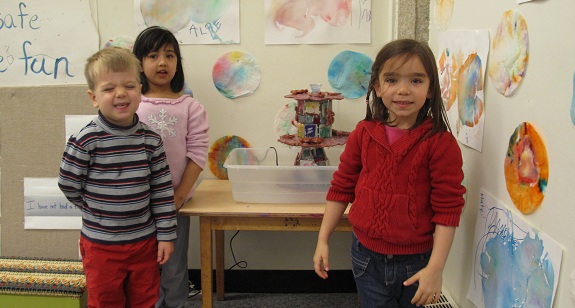UPS students culminate semester-long study of water by displaying models and other modes of learning
by The College of Education / Jan 17, 2013

The University Primary School (UPS) held its "Culminating Event: The Water Project" in January to show off an entire semester's study of all things water. On the evening of January 11, about 250 parents, siblings, extended family, and friends viewed the water displays, and on January 14, the event was open to visitors from the University of Illinois and the community.
 The event that encapsulated the semester-long project was not as simplistic as it may sound, as visitors quickly "absorbed" when touring UPS. Intricate, student-crafted models were on hand to show the water purification process, how water is essential to our bodies, examples of natural water sources, and water as art, to name a few. (To see how water works in the body, students created a working, life-sized game based on the board game "Operation." The "tweezers" were the metal tongs you'd find in any kitchen.)
The event that encapsulated the semester-long project was not as simplistic as it may sound, as visitors quickly "absorbed" when touring UPS. Intricate, student-crafted models were on hand to show the water purification process, how water is essential to our bodies, examples of natural water sources, and water as art, to name a few. (To see how water works in the body, students created a working, life-sized game based on the board game "Operation." The "tweezers" were the metal tongs you'd find in any kitchen.)
When one student from the second-third grade classroom explained the water purification process to fellow students, she talked about how the impurities are removed from water to make it clean and consumable, and then exclaimed, "We even saw a chicken nugget in there!," referring to what she saw during the class' field trip to the Decatur Sanitary District. There, students were able to see the water purification process first-hand, according to Ali Lewis, interim director of the school. "They were very interested in how flushed water becomes clean," Lewis said.
Last semester's water investigation was broken down into subtopics based on children's experiences and interests along with learning goals, according to Lewis. Preschool students studied water as art, water ecosystems, and how "people made water ways." The K-1 students examined "water and our bodies," animals and water, and weather. The second-third grade students investigated three components of local water use: its source, how it travels through the local infrastructure, and its return to the ground.
UPS staff relied on c ollaboration across campus to ensure a successful project, including help from the ceramics lab (water as art), Illinois State Water Survey, Hydrosystems Lab, weather scientists, and Krannert Art Museum. The staff at Krannert designed a special tour for the students about how water can be used in art—either literally, as in fountains and as part of clay sculpture—or figuratively, as in water as a subject of art. Students even visited every fountain on campus last semester as well as some natural sources of water such as the rain garden.
ollaboration across campus to ensure a successful project, including help from the ceramics lab (water as art), Illinois State Water Survey, Hydrosystems Lab, weather scientists, and Krannert Art Museum. The staff at Krannert designed a special tour for the students about how water can be used in art—either literally, as in fountains and as part of clay sculpture—or figuratively, as in water as a subject of art. Students even visited every fountain on campus last semester as well as some natural sources of water such as the rain garden.
Lewis said the school selects topics that pique children's natural curiosity. In fact, Lewis had one water question that she wanted the kids to answer during the unit, and that is why water towers always go up, i.e., why are they usually so narrow and tall? The answer they found: water pressure.
The youngest students (preschoolers) wanted to learn all about water slides and pools, and that was a perfect starting point, Lewis said, since the desire to learn about various aspects of water were based on each student's respective experiences, which can vary depending on age. "We guide and mediate the topics and how the topics are presented but it all went back to 'where do we get the water,'" Lewis explained. "The kids, regardless of their grade and age, now have in-depth understandings (about water) but they came up with different representations in their models," she said.
Through the semester-long topics, students at UPS "gather an understanding—not just of the details, but they gain a conceptual understanding of the topic, along with all the other things we do here. And the conceptual understanding is really the important part," Lewis said.
She said the semester investigations—regardless of topic, whether it is the prairie, water, or the food we eat—are integrated with day-to-day subject matter, from math to art.
Lewis said the goal of UPS is to constantly create dispositions of learners. "We want them to investigate. We want them to learn, and to answer their own questions—in this case, about water."
Editor's Note: University Primary School is an early childhood lab school affiliated with the College of Education at the University of Illinois and serves preschool through third grade children in a project-based curriculum. The school is accepting enrollment applications for the 2013-2014 academic year now through March 15, 2013. For more information about enrollment, families may visit the school's website or call (217) 333-3996.